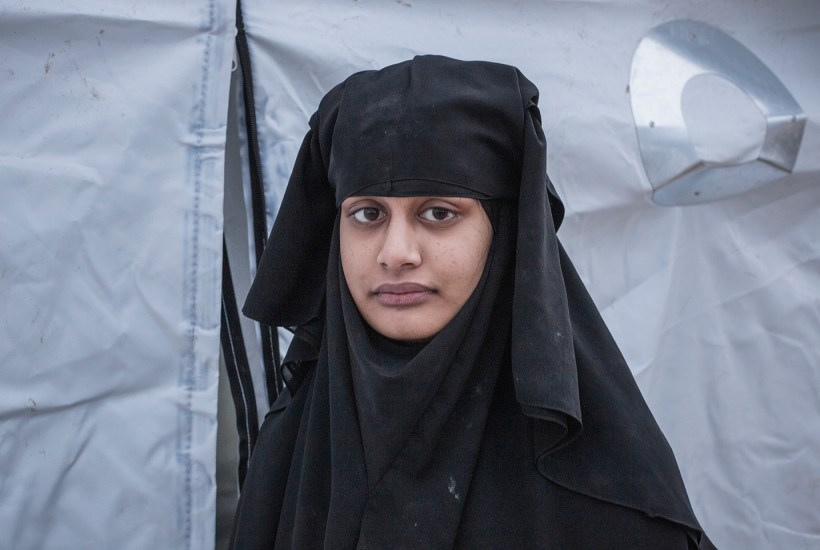The debate sparked by Josh Baker’s BBC podcast on Shamima Begum, and her teenage flight to join Isis, has divided opinion sharply into two camps. According to one, she was a naive 15-year-old cynically groomed by hardened operatives in the most feared terror organisation in the world. No, says the other, she was a capable girl who – knowing of Isis atrocities – made a highly determined decision to join them. But can’t both things be true at once, as they are for so many young recruits to extremism?
Listening, one is immersed in the surreal mix of mundanity and horror which defined Begum’s world after leaving home in London’s Bethnal Green. When interviewed now by Baker, she still reveals a stubborn difficulty in distributing moral weight to the expected places. Among the things she packed for Syria, she recalls, were favourite ‘candies’, because there ‘you cannot find mint chocolate, and that’s tragedy’. The word ‘tragedy’ might more aptly be applied, of course, to the fate of abducted Yazidi girls, bought and sold as Isis slaves very near to where Begum lodged in Raqqa. But on the subject of Isis atrocities she has a tendency to appear numbed, or cagey – although that may be partly to avoid either incriminating herself or attracting reprisals in the Syrian refugee camp where she is stranded after being denied re-entry to the UK.
How much did she know about Isis barbarity before she left, Baker asks. Not much, she claims, saying she didn’t see its vicious beheading videos until she reached Syria. One time, she says, a London schoolmate told her about footage of Isis putting a Jordanian pilot in a cage and burning him alive, but her former schoolfriend Sharmeena – already in Syria – apparently reassured her that was western disinformation. Baker is plainly sceptical, noting that Begum admitted prior awareness of Isis horrors in previous interviews. She does concede, however, that her early view of Isis was akin to infatuation, like ‘when you’re in love and you don’t want to see the person’s faults’. Crossing the border into Syria with two schoolfriends, she viewed the gun-toting Isis heavies as ‘protectors’. Although the journey was ‘wrong’, she also describes it as ‘exciting’ or like ‘a movie’: in part, the girls saw their flight to Isis as a shared liberation from the restrictions of their London lives.
A squalid, airless trap hardened around that first, disastrous decision: Begum’s marriage after a few days to a Dutch jihadi; pregnancy and motherhood to three children, all of whom later died; and the death of one travelling companion, Kadiza Sultana, and disappearance of the other, Amira Abase. But the podcast is also about the wider world of the Isis caliphate, a bizarre and brutal magnet for malcontents and psychopaths from across the globe. This remains edgy territory to investigate: Baker and his team are recorded beating more than one hasty retreat. Between them, however, they do a forensic and engrossing job of reconstructing Begum’s path, including the revelation that she and her friends were first taken into Syria by a people-smuggler with links to Canadian intelligence.
Does that change things? Not according to the UK courts, which most recently upheld the government’s decision to revoke Begum’s British citizenship. Yet here her story emerges as grim but not unique, recalling other young women who both caused and experienced damage through a culpable infatuation with a murderous regime. From another era, class and race, we might remember Unity Mitford, who flaunted her adoration of Adolf Hitler in Nazi Germany. Unlike Begum, however, Mitford was allowed to come home.
A very different kind of dislocation from a crumbling political empire is described in The Last Soviet, hosted by Lance Bass. It’s the story of Sergei Krikalev, a Leningrad cosmonaut sent to man the Mir space station in 1991, only for the USSR to disintegrate while he was orbiting Earth. With the Soviet space programme – and funding for his replacement – engulfed in chaos, the unlucky Krikalev was given a choice: to stay on well past his intended limit, or return home to his wife and baby, leaving the space station unmanned. He dutifully chose the former.
Bass, a former member of the 1990s boyband NSYNC, is more qualified in space matters than one might think: he once trained as a cosmonaut in Russia, and this podcast gives his obsession plenty of room to roam. Circling the Krikalev story, early episodes touch on the Soviet triumph of Yuri Gagarin, the Russian cosmonaut who was the first human in space, and the hazardous rescue of Salyut 7, a space station which had lost power and was dangerously adrift. Already, these are absorbing tales of insane bravery, Cold War one-upmanship, and finding oneself trapped – quite literally – on the wrong side of history.
Got something to add? Join the discussion and comment below.
Get 10 issues for just $10
Subscribe to The Spectator Australia today for the next 10 magazine issues, plus full online access, for just $10.
You might disagree with half of it, but you’ll enjoy reading all of it. Try your first month for free, then just $2 a week for the remainder of your first year.















Comments
Don't miss out
Join the conversation with other Spectator Australia readers. Subscribe to leave a comment.
SUBSCRIBEAlready a subscriber? Log in